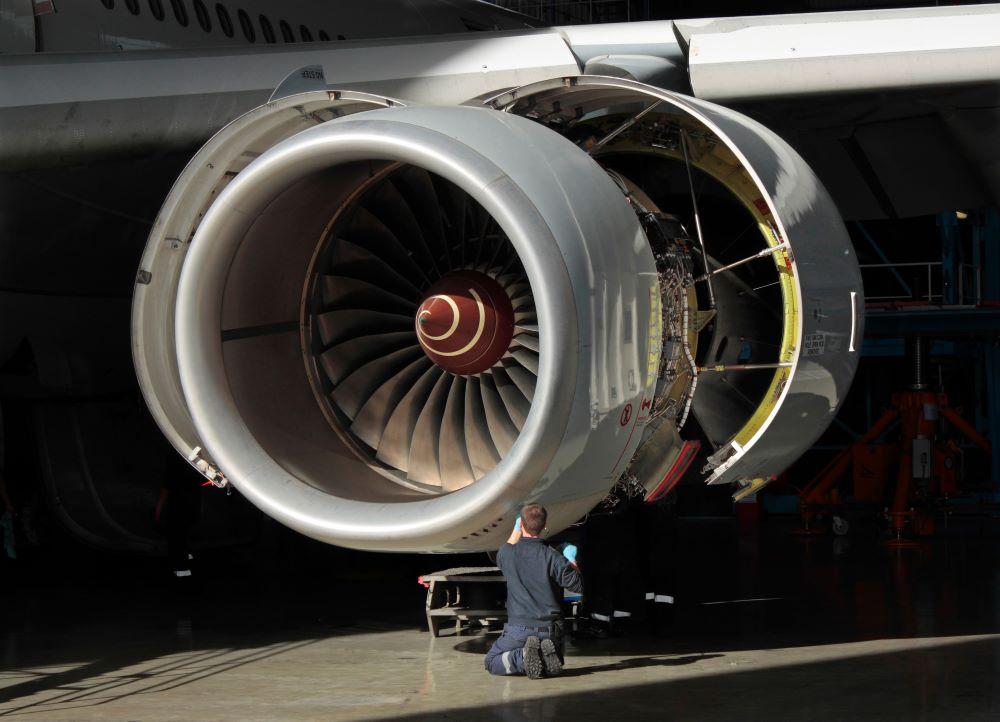This article is published in Aerospace Daily & Defense Report, part of Aviation Week Intelligence Network (AWIN), and is complimentary through Jan 09, 2024. For information on becoming an AWIN Member to access more content like this, click here.

With its purchase of Triumph’s Product Support Group, AAR aims to boost its aftermarket capabilities.
AAR Corp. announced on Dec. 21 that it would buy Triumph’s (TGI) Product Support Group for $725 million in an all-cash deal expected to bolster the Illinois-based company’s aftermarket capabilities.
TGI’s Product Support Group is a third-party repair business that provides MRO services to both commercial and military operators spanning structural components, airframe and engine accessories, interiors, and wheels and brakes. The group has five primary locations: two in Texas, and one each in Arkansas, Kansas and Thailand, with more than 700 employees.
“We believe this acquisition will bring scale to our existing component repair operation at next-generation repair capability, deepen and broaden our customer relationships globally and expand our footprint,” AAR CEO John Holmes said in an earnings call. AAR’s sales rose 16% year-on-year to $545 million in the second quarter of fiscal 2024.
Holmes also highlighted the potential of TGI Product Support Group’s Thailand facility, which he said “will help AAR further penetrate the high-growth Asian market.”
The Asia-Pacific (APAC) region is expected to be the largest driver of MRO demand over the next decade. Data compiled by Aviation Week Network show that APAC will account for 33% of MRO demand in 2024, at $36 billion. That figure is expected to grow to $48 billion by 2033, equivalent to 1.5% compound annual growth.
Investment bank Jefferies estimates that TGI’s total MRO sales stand at $538 million, with the third-party repair segment accounting for 47%, or $257 million of sales, in fiscal 2023.
Including estimated tax benefits of $80 million, AAR expects that the effective purchase price multiple will be 11.7 x fiscal 2024 earnings before interest, tax, depreciation and amortization (EBITDA) and 9.9 x factoring in about $10 million in run-rate synergies.
TD Cowen’s Cai von Rumohr said in a Dec. 21 note to clients that “the deal looks value enhancing.”
Together, the combined businesses could generate more than $220 million in adjusted operating income with a 9.2% adjusted margin, RBC Capital Markets’ Ken Herbert said in a Dec. 21 client note. “We view these pro forma details as a positive for the company, and something that could excite investors. AAR’s acquisition could have the potential to help close some of the margin gap to other commercial aftermarket peers, which should be positive for sentiment on the stock,” he said.
That said, investors have yet to react with exuberance to the deal, which is expected to close in the first quarter of the 2024 calendar year. AAR’s stock fell 0.27% to close at $70.79 on Dec. 21. During after-hours trading, as of 6 p.m. EST, the share price had dropped an additional 5.35% to $67.00.
While acknowledging that the MRO business continues to benefit from ongoing supply chain hiccups, Herbert said that investors increasingly worry that any slowdown in air travel could adversely impact aftermarket spending. “We continue to believe aerospace aftermarket strength will be a source of upside into calendar 1H24, but some investors may question the timing of the acquisition,” he said.
This is AAR’s second major deal of the year following its March purchase of aircraft MRO and fleet management software provider Trax for roughly $120 million, as well as the third major deal of 2023 involving the acquisition of a company that provides parts manufacturer approval (PMA) parts. The other two were HEICO’s acquisition of Wencor and VSE Corp.’s acquisition of Desser Aerospace.
Though TGI is divesting a large part of its MRO business, it will retain its spares and IP-based MRO, which account for 29% and 24% of MRO sales respectively. The spares business is the most profitable by Jefferies’ calculations.
TD Cowen’s Cai also emphasized the benefits of the deal for TGI, which he said would “allow TGI to achieve major deleveraging while retaining its key IP-based systems operations” such as gearboxes, actuation, thermal solutions and interiors.
Looking ahead to the third quarter of fiscal 2024, Holmes said in the earnings call that AAR expects continued year-over-year sales and earnings growth in the range of high single digits to 10%, “consistent with the quarter we just delivered.”
“The macro environment for the commercial aviation aftermarket continues to be very strong and our customers have signaled strong demand for our services in calendar 2024,” he added.





